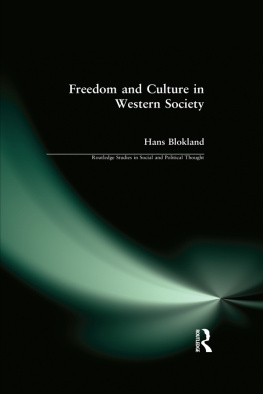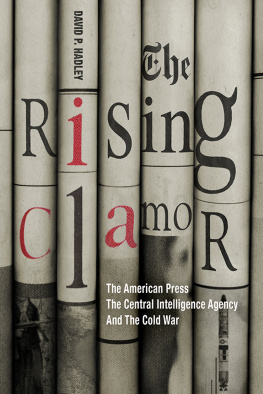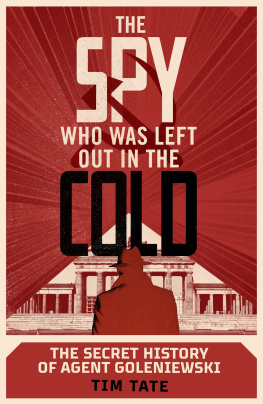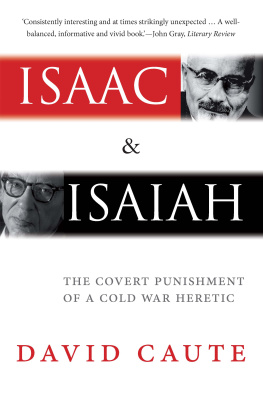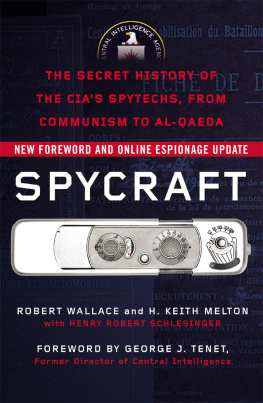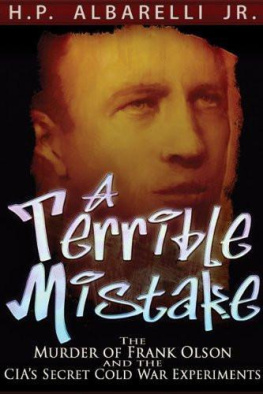Introduction
The way to carry out good propaganda is never to appear to be carryingit out at all.
Richard Crossman
During the height of the Cold War, the U.S. government committed vast resources to a secret program of cultural propaganda in Western europe. A central feature of this program was to advance the claim that it did not exist. It was managed, in great secrecy, by Americas espionage arm, the Central Intelligence Agency. The centerpiece of this covert campaign was the Congress for Cultural Freedom, run by CIA agent Michael Josselson from 1950 until 1967. Its achievements not least its duration were considerable. At its peak, the Congress for Cultural Freedom had offices in thirty-five countries, employed dozens of personnel, published over twenty prestige magazines, held art exhibitions, owned a news and features service, organized high-profile international conferences, and rewarded musicians and artists with prizes and public performances. Its mission was to nudge the intelligentsia of Western europe away from its lingering fascination with Marxism and Communism towards a view more accommodating of the American way.
Drawing on an extensive, highly influential network of intelligence personnel, political strategists, the corporate establishment, and the old school ties of the Ivy League universities, the incipient CIA started, from 1947, to build a consortium whose double task it was to inoculate the world against the contagion of Communism and to ease the passage of American foreign policy interests abroad. The result was a remarkably tight network of people who worked alongside the Agency to promote an idea: that the world needed a pax Americana, a new age of enlightenment, and it would be called the American Century.
The consortium the CIA built up consisting of what Henry Kissinger described as an aristocracy dedicated to the service of this nation on behalf of principles beyond partisanshipwas the hidden weapon in Americas Cold War struggle, a weapon which, in the cultural field, had extensive fallout. Whether they liked it or not, whether they knew it or not, there were few writers, poets, artists, historians, scientists, or critics in postwar europe whose names were not in some way linked to this covert enterprise. unchallenged, undetected for over twenty years, Americas spying establishment operated a sophisticated, substantially endowed cultural front in the West, for the West, in the name of freedom of expression. defining the Cold War as a battle for mens minds, it stockpiled a vast arsenal of cultural weapons: journals, books, conferences, seminars, art exhibitions, concerts, awards.
Membership of this consortium included an assorted group of former radicals and leftist intellectuals whose faith in Marxism and Communism had been shattered by evidence of Stalinist totalitarianism. emerging from the Pink decade of the 1930s, mourned by Arthur Koestler as an abortive revolution of the spirit, a misfired renaissance, a false dawn of history, their disillusionment was attended by a readiness to join in a new consensus, to affirm a new order which would substitute for the spent forces of the past. The tradition of radical dissenter, where intellectuals took it upon themselves to probe myths, interrogate institutional prerogative, and disturb the complacency of power, was suspended in favor of supporting the American proposition. endorsed and subsidized by powerful institutions, this non-Communist group became as much a cartel in the intellectual life of the West as Communism had been a few years earlier (and it included many of the same people).
There came a time... when, apparently, life lost the ability to arrange itself, says Charlie Citrine, the narrator of Saul Bellows Humboldts Gift. It had to be arranged. Intellectuals took this as their job. From, say, Machiavellis time to our own this arranging has been the one great gorgeous tantalizing misleading disastrous project. A man like Humboldt, inspired, shrewd, nutty, was brimming over with the discovery that the human enterprise, so grand and infinitely varied, had now to be managed by exceptional persons. He was an exceptional person, therefore he was an eligible candidate for power. Well, why not? Like so many Humboldts, those intellectuals who had been betrayed by the false idol of Communism now found themselves gazing at the possibility of building a new Weimar, an American Weimar. If the government and its covert action arm, the CIA was prepared to assist in this project, well, why not?
That former left-wingers should have come to be roped together in the same enterprise with the CIA is less implausible than it seems. There was a genuine community of interest and conviction between the Agency and those intellectuals who were hired, even if they didnt know it, to fight the cultural Cold War. The CIAs influence was not always, or often, reactionary and sinister, This view of the CIA as a haven of liberalism acted as a powerful inducement to collaborate with it or, if not this, at least to acquiesce to the myth that it was well motivated. And yet this perception sits uncomfortably with the CIAs reputation as a ruthlessly interventionist and frighteningly unaccountable instrument of American Cold War power. This was the organization that masterminded the overthrow of Premier Mossadegh in Iran in 1953, the ousting of the Arbenz government in Guatemala in 1954, the disastrous Bay of Pigs operation in 1961, the notorious Phoenix Program in Vietnam. It spied on tens of thousands of Americans; harassed democratically elected leaders abroad; plotted assassinations; denied these activities to Congress; and, in the process, elevated the art of lying to new heights. By what strange alchemy, then, did the CIA manage to present itself to high-minded intellectuals like Arthur Schlesinger as the golden vessel of cherished liberalism?
The extent to which Americas spying establishment extended its reach into the cultural affairs of its Western allies, acting as unacknowledged facilitator to a broad range of creative activity, positioning intellectuals and their work like chess pieces to be played in the Great Game, remains one of the Cold Wars most provocative legacies. The defense mounted by custodians of the period which rests on the claim that the CIAs substantial financial investment came with no strings attached has yet to be seriously challenged. Amongst intellectual circles in America and Western europe there persists a readiness to accept as true that the CIA was merely interested in extending the possibilities for free and democratic cultural expression. We simply helped people to say what they would have said anyway, goes this blank check line of defense. If the beneficiaries of CIA funds were ignorant of the fact, the argument goes, and if their behavior was consequently unmodified, then their independence as critical thinkers could not have been affected.
But official documents relating to the cultural Cold War systematically undermine this myth of altruism. The individuals and institutions subsidized by the CIA were expected to perform as part of a broad campaign of persuasion, of a propaganda war in which propaganda was defined as any organized effort or movement to disseminate information or a particular doctrine by means of news, special arguments or appeals designed to influence the thoughts and actions of any given group. It is useless to dispute these definitions. They are littered across government documents, the donnes of American postwar cultural diplomacy.
Clearly, by camouflaging its investment, the CIA acted on the supposition that its blandishments would be refused if offered openly. What kind of freedom can be advanced by such deception? Freedom of any kind certainly wasnt on the agenda in the Soviet Union, where those writers and intellectuals who were not sent to the gulags were lassoed into serving the interests of the state. It was of course right to oppose such unfreedom. But with what means? Was there any real justification for assuming that the principles of Western democracy couldnt be revived in postwar europe according to some internal mechanism? or for not assuming that democracy could be more complex than was implied by the lauding of American liberalism? To what degree was it admissible for another state to covertly intervene in the fundamental processes of organic intellectual growth, of free debate and the uninhibited flow of ideas? Did this not risk producing, instead of freedom, a kind of ur-freedom, where people think they are acting freely when in fact they are bound to forces over which they have no control?


